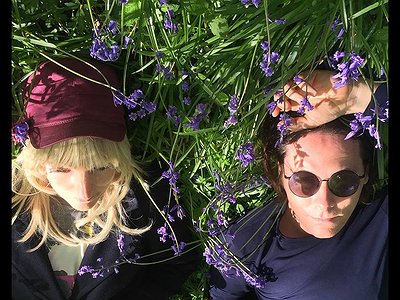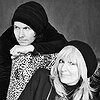Could you take us through a day in your life, from a possible morning routine through to your work? Do you have a fixed schedule? How do music and other aspects of your life feed back into each other - do you separate them or instead try to make them blend seamlessly?
I am writing songs all day long whether it be with an instrument or just running new songs through my head and letting my imagination do it’s thing. I am constantly and always looking to bag a new song, catch a melody on the wind or am listening out for a lyric in an overheard in conversation. As a band we get together at least two days a week. As a writer all of life feeds back into songwriting that said I personally probably need to learn to be more present in the moment rather than off in my own head but I can’t stop the waterfall. As a married musical duo we’ve sacrificed a lot to create our music and there are moments where it can get a bit tangled up some of which are very funny and some of which require time and space be given to either the music away from the domestic or the other way round.
Could you describe your creative process on the basis of a piece or album that's particularly dear to you, please? Where did the ideas come from, how were they transformed in your mind, what did you start with and how do you refine these beginnings into the finished work of art?
There’s a new song on our upcoming new album called ‘Hits Like A Fix’ which is probably something I’m most proud of and is in my opinion one of our greatest records so far. To be honest it was a battle mainly because I wouldn’t let go of a pre-conceived take on it. The song was written in a lay-by after a gig on guitar. I initially played it with the band and it was quite up tempo and in an alternative indie sort of vein.
Ava was never really impressed with the take on it but she liked the song. She could hear it slowed down and wanted to cut out some of the song and put it on piano and sing lead vocal. I resisted and resisted and resisted thinking I knew the right way for the song until one night I gave in and opened up the piano and started playing and instantly this piece of music arrived and it became apparent it was what Ava was looking for for the direction of the song.
It’s one of my favourite pieces of music I’ve ever written and I also know that without Ava’s instinct on it it would never have been written. Her vocal on this song is sublime and our drummer Ryan’s drum work is intimate and huge at the same time. It’s the most minimal record we’ve ever made and it’s easily one of our best. I also love it because it’s proof that collaboration is more important than thinking you’re right and sometimes you have to follow and trust someone else.
There are many descriptions of the ideal state of mind for being creative. What is it like for you? What supports this ideal state of mind and what are distractions? Are there strategies to enter into this state more easily?
I used to think there was an ideal state of mind but I don’t believe in that anymore. It is there for me at any time and I don’t need to have some perfect condition to create in. Practically speaking it’s nice to have everything set up and ready to go but we made our first album from our kitchen whilst feeding our child and paying the bills and doing the life stuff making important decisions about EQ whilst Ava was making soup and I was about to go out and gig to pay the bills. It wasn’t a perfect situation to create in but it got made.
How is playing live and writing music in the studio connected? What do you achieve and draw from each experience personally? How do you see the relationship between improvisation and composition in this regard?
There’s a desire to try and re-create what you’ve written in the studio live. It’s not always possible and it’s not always the best approach. A record for the most part is created and is consumed by people in the intimacy of their own daily lives, if you’re lucky you get to soundtrack their lives and that’s an honour but that transaction between you and the listener is a different one from a live experience. You want to play the songs as people know them but you also want to feel free in the moment to express yourself and also read and respond to the energies in the room.
You also have a part to play in a band as part of a machine. My role is to provide a rhythm and chord changes which is integral to the performance and so it has to be administered efficiently to make the mechanics of the live performance work, therefore in a band like ours the joy in live is when all the mechanics of the machine are well oiled and are functioning so well that it requires no thought. At that point when you are part of a communion with your band yet you are free to be free without thinking about any of it that’s the sweet spot. Each performance for me is about trying to be as free as possible.
There is also the notion we speak about a lot in the band of connection with the audience. Ava is a sheer force of nature live. She really comes alive and has an amazing and joyful and intense connection to the audience. I’m more insular I’m afraid, for me to be free to give my all I have to go inwards to get it out. I’m working in a fearless connection without distraction to the audience.
How do you see the relationship between the 'sound' aspects of music and the 'composition' aspects? How do you work with sound and timbre to meet certain production ideas and in which way can certain sounds already take on compositional qualities?
Sound is as important as composition really. Think of any great record or piece of music and often you’ll think of the sound of it. Composition without sound is just theory or scribbles or an idea in your own head. Sound is colour. Our band have a sound and that sound is born out of 4 individuals meeting each other. Ava and I are very lucky in that our voices match and so there’s the sound of our own voices as individuals but there’s also a sound that is created when the two are together which is beyond us as individuals.
I tend to push all the time when playing instruments and our drummer Ryan tends to hang back on the beat so there’s a sound there between us a sort of tension and push and pull. Our bassist/guitarist Rob naturally complements my writing style effortlessly. In my own head as a guitarist there’s a location and place in my imagination which is an image of what I’m trying to sound like. Ava works in pictures and images as well. She will often ask us as a band or suggest we need to find a sound like ‘the breath of god’!
Our sense of hearing shares intriguing connections to other senses. From your experience, what are some of the most inspiring overlaps between different senses - and what do they tell us about the way our senses work? What happens to sound at its outermost borders?
The senses are everything. We live in a world of logic and rules and science and maths and legalities but the senses defy all of the above. As a writer I try to sharpen my senses every day. Why does that sudden warm breeze take me back to that conversation I had with a stranger in a park? Why does that song make me cry and think of an old school friend who I haven’t thought of for years? It’s a marvellous mystery and one which I have dedicated my life to.
My job as I see it is to try to document these feelings evoked by my senses to immortalise the memory or experience or person. I’ve grown up with sound in my head all the time and the most fascinating yet scary element to the sense of sound personally is before I go to sleep as something else takes over, the sound gets louder and becomes uncontrollable. I have very active and lucid dreams and the sounds I hear before I go to sleep are almost like the sounds of a different place and can be quite overwhelming. I’m hoping one day I’ll find out what it’s all about. Maybe it’s best not to know.
Art can be a purpose in its own right, but it can also directly feed back into everyday life, take on a social and political role and lead to more engagement. Can you describe your approach to art and being an artist?
I chose to be an artist when I was 18 and went to art college. I knew from the age of 6 that being an artist was who I was and all I could be but I remember making choice to commit to it fully and make that a priority above comfort. An artist to me is somebody who has to create no matter what. Personally I see everything as potential art, every conversation every experience and I have cultivated an approach in which I am constantly on the look out for the spark that ignites.
Everything is art, everything you look at and hear or watch or do. There is an art to how you tie your shoelaces, an art to the sound of traffic, an art to an argument, an art to dying, and an art to life being born. Nature is the greatest artist of all. I’m a seeker for beauty and truth in every waking moment. I just want to try and illuminate the world as I see it and the things I’ve realised, the people I’ve met and loved and formulate that into song so that I can try and understand life and hope that my little song of expression and understanding might help someone else in some way like the great artists I love have helped me.
It is remarkable, in a way, that we have arrived in the 21st century with the basic concept of music still intact. Do you have a vision of music, an idea of what music could be beyond its current form?
I think the next big thing will be holograms and virtual reality. I think you will be able to buy a format which allows you to listen to the music and experience it either as a hologram or in a virtual reality form in your home. This is hugely exciting.



